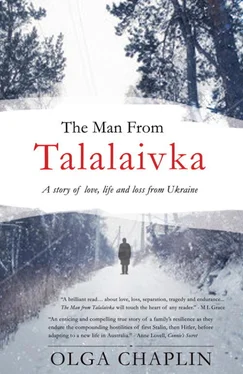“Dyna,” Peter somehow contained the panic within as he asked, seemingly nonchalantly, “no sign of Vanya yet? He hasn’t returned? Kysma is already finished on his fields. He gave Vanya permission to come home.” Evdokia thoughtfully shook her head, without looking up. His heart sank.
“Peta,” she ventured softly, “Vanya is hardly home these days. They seem to need him even more on Kysma’s fields. They have few men there too. And you know how fond he is of Shyra. They are both so young, just sixteen, but Kysma likes our Vanya… and, in these times…” She shook her head again, as if unable to contemplate the future. The precariousness of life was not indulgent thinking. It was a reality. Her own beloved older brother, an innocent pawn in the early weeks of fighting for his country, lay somewhere, unknown, on his native soil, one lonely brave soldier among the millions fallen.
Peter’s stomach tightened, his fear for Vanya too real. He hesitated. His wife could not take more heartache. Her outward calm belied her own inner turmoil, her own grief and anxieties: the dark wells of her eyes, the loss of weight, the sad acceptance of her long hard days, said all. His heart skipped a beat, eyes stinging with pained tears. Looking at his forlorn wife he was reminded, too speedily for him to check his own emotions, of happier past times. And Manya’s death still plagued, tortured, her since that dark day shortly before the German invasion of their region.
He blinked hard, shutting away private memories, private thoughts. The need to find Vanya was paramount. He had to force himself, remind himself, that their little family was not unique in its pain and hardships. Other families throughout the region suffered similarly, were often dealt even a worse hand in Hitler’s deadly game of stacked cards. Hitler’s murderous regime had cast a huge net, a mighty long shadow, over their beloved Ukraine. What the tyrant’s henchmen Heydrich and Himmler had unleashed and exacted in western Europe, so, too, had their underling Koch exacted from the Ukraine and its people, from the relative safety of his Kiev headquarters. The Nazi regime had gorged well on its ‘breadbasket’ of the Ukraine. Peter knew it would not be relinquished lightly. Everywhere, there were testimonies to their cruel sport. Their ink stains of infamy would indelibly stain their own countrymen as surely as the funereal markings placed on their innocent foes, Jewish and others alike.
At least, he reminded himself, the commandant of their kolkhoz area had not played sport with their lives. He had allowed them their subsistence living, even observing a peculiar personal respect for these stoic, conquered Ukrainian people. But Peter also knew this could all change at a moment’s notice. Acts of treachery ended in executions, often of whole families. The dangling bodies so often seen in nearby villages earlier in the war, reminders of the Nazi regime’s will to succeed at any cost, were again prevalent with the German retreat as it attempted to contain counter-movements and partisan activity. If Ukrainian life under Stalin was cheap, it was nigh on worthless under Hitler’s tutelage.
Panic pricked his flesh, his stomach still gripped tensely as they returned to the farmhouse. Dusk had cloaked the kolkhoz fields, but there was still no sign of Vanya. He could not tell his wife of his fears for Vanya. He would not tell her of the fall of Konotop. Evdokia was not a political being, but she knew of the town, its proximity to this kolkhoz area. He needed to find Vanya before tragedy struck. He opened the farmhouse door and kissed Evdokia and tiny Nadia, tousled little Mykola’s white-blonde hair. The waft of familiar nightly broth hit his nostrils but he could not, would not, eat. On pretext of another veterinary check, he manoeuvred his intelligent stead in the direction of the shadowy woods.
The pitch-black night, eeried by slivers of moonlight that shone like an intermittent beacon over the woods and hill, gave little protection as he tethered his horse under a thicket and gave it his last precious lump of halva kept for this purpose. He patted his loyal companion, grateful it remained silent as if it, too, understood the import of its master’s mission. He crept hesitantly in the direction of the place he knew Vanya had frequented, out of bounds most times. Vanya had found there a reclusive place, seemingly removed from the incomprehensible world in which he lived.
The German occupation had weighed heavily on his young man’s shoulders. Now, Vanya was so impressionable, even imbued with the ideas of a Ukrainian national resurgence one day, once the German menace was gone. Peter knew better. He had experienced first hand Stalin’s iron will. The tyrant would not rest until he had retrieved everything lost to his nemesis counterpart, Hitler. Russian partisan activity was now organised, and increasing in military support, in these days of Stalin’s new successes. The German High Command knew this. The orders were clear, to every commandant, whatever his personal ethics. Whole families, nay, whole villages, were wiped out in reprisal for involvement with Russian and Ukrainian partisans.
From out of nowhere a brilliant flash of light, like an aberrant comet, whooshed over him. Stunned, he instinctively fell to the ground, face soaked in the leaves and heavy night dew. “My God!” he murmured as he lay there motionless, gripped with fear, puzzled. He looked back at the smoking ground behind him. This was not a German bomb; he knew this. This was like a katyshka, fired from some Russian gunner. Almost certainly, it came from an ‘advance group’ on the eastern fringes of the kolkhoz fields, in this vicinity, protected by these woods. They were that close now, preparing to soften up the German defence line before a major attack.
Peter could taste blood in his mouth as his teeth clenched, as he hesitated for a split-second, his heart pounding so furiously he felt as if a time bomb was about to explode within his body. He knew instinctively these woods and the rising hill above him would become another battleground for the opposing armies and that the German evacuation would be the signal for a Russian attack of this area. He had to find Vanya, plead with him to return to the relative safety of their farmhouse. He dared not contemplate what Vanya was doing, what his decision would be: only that he must try to find his son, warn him of the overwhelming dangers. “Hospode pomelyue,” he prayed silently, crossing himself. Hunching low, his face stinging with tension, the cold mist biting in the oppressive night dew, he lunged into the darkness, towards the hill, towards the partisans’ bullets.

Chapter 24
“Vanya… are you in there?” Peter’s hoarse whisper was a stranger’s voice, melding into the misty atmosphere. He crouched lower to the ground, boots crunching the crystallising droplets of heavy night dew on the undergrowth. His stomach tensed as a figure seemed to appear through the foggy dimness, then disappeared, as threatening clouds shut out the moon’s slivers of light. Every tree, every mound, was distorted in this no-man’s-land of the hill, shadows playing tricks on perception and reality. “Vanya… Vanya…” He stopped. Each sound he uttered exposed him to a partisan’s bullet.
“Who comes here?” an unrecognisable voice growled through the blackness, almost within arm’s reach. His skin pricked with unbearable tension. “Vanya… is that you?… Vanya… it’s your father, Peter. Answer me, I beg you.” In the darkness, Vanya touched his father’s shoulder and, whispering for him to remain silent, led him to the safety of a cavern-like undergrowth.
Читать дальше













